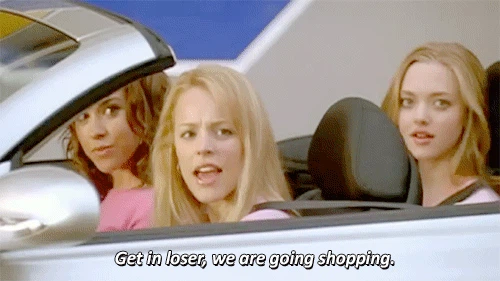Is The Female Love Of Shopping Rooted In The Primal “Gathering” Instinct?
Is she a shopaholic, or is she just living out an evolutionary biological instinct? To find out the answer, we need to ask nature.

We’ve all been there: You go shopping with a brother or a cousin or a boyfriend, and conflict ensues. You want to take your sweet time sifting through every rack in the store, searching high and low for a specific silhouette or an exact shade of pink, and he can’t understand why you won’t just grab the first thing that fits you and head to the checkout line. Shopping energizes you, while it bores him. How come? The difference, interestingly enough, might boil down to DNA.

What Actually Is the Gathering Instinct?
In a time before humanity formed permanent settlements that became established nations, our ancestors were nomads who traveled from one fertile land to another in search of food and shelter. Longstanding evolutionary theory says that in these nomadic societies, men were typically hunters and women were typically gatherers. This means that while the male members of a community hunted game, the females foraged for wild resources like fruits and greens. This separation of tasks may have come about because foraging was a task women could do even while pregnant or nursing, unlike hunting. But what does any of this have to do with shopping?
According to Professor Donald Hantula at Temple University, women’s natural forager instinct hasn’t been forgotten in the modern age. Instead, it’s been channeled toward “modern consumer settings such as malls, grocery stores, and online shopping.” A 2009 study on evolved foraging psychology found that women “scored higher on skills and behaviors associated with gathering, the degree to which shopping is seen as recreational … and the tendency to see new locations as opportunities for shopping.”
By contrast, men’s hunter instinct makes them more likely to see shopping as a pursuit in which they identify their target, find it in the store, and buy it immediately. In the nomadic days, if you took too long to secure your prey or skin a carcass, you’d lose a potential meal and have to start the hunt all over again. To men, the acquisition of resources is more about efficiency than recreation.
The gatherer role doesn’t just make women enthusiastic shoppers – it’s also the reason we can see more shades of the same color than men, which apparently helped our ancestors distinguish whether plants were ripe and/or safe to eat. That’s something to keep in mind the next time you ask your boyfriend to help you choose between two similar shades of nail polish and he says they look the same. He’s not being difficult; his brain most likely just can’t tell the difference.
Can We Override Our Instincts?
Even though humans may be born with a set of preprogrammed instincts, we’re not slaves to our animal urges. We have a rational will that can tell us which instincts are wise to act on and which ones we should leave buried. So is the gathering instinct one that we should always listen to?

It’s important to remember that while a biological urge may explain poor decision making, it doesn’t excuse it. The innocent gatherer instinct can turn into a genuine shopping addiction if left unchecked. According to a recent market data report, 80% of shopping addicts are women who typically develop compulsive buying habits in their teens and 20s. Even though a compulsive shopping disorder is usually triggered by something other than primal instincts – a desire to cope with stress, the need to “keep up with the Joneses” – women are more likely to fall into this addiction than men because we’re biologically geared toward it.
As satisfying as scoring a nice find can be, financial literacy will always be more important than having the newest, flashiest thing. Advertisers and retailers know how much we love to shop, and they’d love nothing more than to watch us buy more and more without a second thought. As fun as a day out shopping can be, do we really need a collection of 20 different Stanley cups or a drawer full of barely-touched makeup that TikTok told us we just had to buy?
As much as consumption can be a pitfall of the gathering instinct, there are also upsides. The greatest modern advantage of this instinct is that it can help us be more mindful, meticulous shoppers. Our increased sensitivity to color, texture, etc. makes us better than men at tracking down the best possible product for whatever need we have. If you’ve ever had a man insist that you come shopping with him so that your discerning eye can tell him what’s worth buying and what should just be left on the rack, it’s probably because he recognizes this evolutionary advantage that women hold.

Closing Thoughts
Technology changes rapidly, but human genetics take longer to evolve. Even though hunter-gatherer societies have now been replaced by more complex industrial civilizations, that doesn’t mean our old genetic codes simply disappeared. Understanding where our instincts come from and how they differ between demographics can help us better understand ourselves and others. When we know why we’re motivated to do the things we do, we’re better able to analyze whether we should act on those motivations or not.
So, is the voice in the back of our heads telling us to forage through Target or Sephora our ally or our enemy? That depends on whether we use our shopping instinct when it makes sense to or if we fall prey to unnecessary consumerism. Our natural strength can also be a weakness. The next time you find yourself conflicted in the checkout line, ask yourself if you’re foraging for something beneficial like your ancestors were or if you’re unconsciously letting consumer culture exploit what was meant to be a feminine superpower.
Support our cause and help women reclaim their femininity by subscribing today.